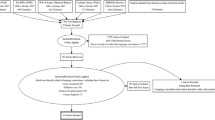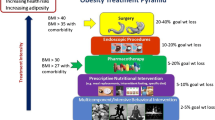Abstract
Background
Despite the increasing obesity prevalence among American adults, relatively few qualified patients proceed to bariatric surgery. Suggested explanations include referral barriers for weight loss management at primary care provider (PCP) visits. This study aims to assess the referral and practice patterns of PCPs treating patients with obesity. Our goal is to understand treatment barriers in order to implement targeted interventions that enhance quality of care.
Methods
A 39-question electronic survey was emailed to PCPs at a single academic institution with community physicians. Questions explored providers’ demographics, referral patterns, and knowledge of pathophysiologic obesity mechanisms and bariatric surgery qualifications. Frequency and univariate analyses were performed and compared providers’ demographics, positions, and BMIs between referring providers and non-referring providers.
Results
Of 121 surveys distributed, we achieved a 33.9% response rate (n = 41). 78.0% stated that > 15% of their patients in the preceding year were classified as obese. PCPs indicated initiating weight loss management conversations < 50% of the time with 48.8% of patients. Provider-identified barriers to discussing weight loss surgery included being unsure if patient’s insurance would cover the procedure or if patients would qualify (24.4% vs. 19.5%). In addition, 43.9% of providers felt that the risks of bariatric surgery outweigh the benefits.
Conclusion
Despite a large percentage of patients cared for by PCPs being classified as obese, few providers initiate discussions on weight loss options with potentially eligible surgical candidates. The barriers identified indicate an opportunity for improved education on patient qualifications, strategies for streamlining conversations and referrals, and reinforcement of the safety of surgical weight loss. Providers’ desire for this education demonstrates an opportunity to work toward minimizing the referral gap by increasing patient conversations about these topics.
Similar content being viewed by others
Abbreviations
- PCP:
-
Primary care provider
- LSG:
-
Laparoscopic sleeve gastrectomy
- RYGB:
-
Roux-en-Y gastric bypass
- BMI:
-
Body mass index
- APP:
-
Advanced practice provider
References
Andolfi C, Fisichella PM (2018) Epidemiology of obesity and associated comorbidities. J Laparoendosc Adv Surg Tech 28(8):919–924. https://doi.org/10.1089/lap.2018.0380
Finkelstein EA, Khavjou OA, Thompson H, Trogdon JG, Pan L, Sherry B, Dietz W (2012) Obesity and severe obesity forecasts through 2030. Am J Prev Med 42:563–570. https://doi.org/10.1016/j.amepre.2011.10.026
Stolberg CR, Hepp N, Juhl AJA, Deepti BC, Juhl CB (2017) Primary care physician decision making regarding referral for bariatric surgery: a national survey. Surg Obes Relat Dis Off J Am Soc Bariatr Surg 13:807–813. https://doi.org/10.1016/j.soard.2017.02.002
Tremmel M, Gerdtham U-G, Nilsson PM, Saha S (2017) Economic burden of obesity: a systematic literature review. Int J Environ Res Public Health 14(4):435. https://doi.org/10.3390/ijerph14040435
(2005) Consensus statement: bariatric surgery for morbid obesity: Health implications for patients, health professionals, and third-party payers. In: Am. Soc. Metab. Bariatr. Surg. https://asmbs.org/resources/consensus-statement. Accessed 28 Feb 2019
Arterburn DE, Courcoulas AP (2014) Bariatric surgery for obesity and metabolic conditions in adults. BMJ 349:g3961. https://doi.org/10.1136/bmj.g3961
Arterburn DE, Olsen MK, Smith VA, Livingston EH, Scoyoc LV, Yancy WS, Eid G, Weidenbacher H, Maciejewski ML (2015) Association between bariatric surgery and long-term survival. JAMA 313:62–70. https://doi.org/10.1001/jama.2014.16968
Funk LM, Jolles SA, Greenberg CC, Schwarze ML, Safdar N, McVay MA, Whittle JC, Maciejewski ML, Voils CI (2016) Primary care physician decision making regarding severe obesity treatment and bariatric surgery: a qualitative study. Surg Obes Relat Dis Off J Am Soc Bariatr Surg 12:893–901. https://doi.org/10.1016/j.soard.2015.11.028
Foster GD, Wadden TA, Makris AP, Davidson D, Sanderson RS, Allison DB, Kessler A (2003) Primary care physicians’ attitudes about obesity and its treatment. Obes Res 11:1168–1177. https://doi.org/10.1038/oby.2003.161
Balduf LM, Farrell TM (2008) Attitudes, beliefs, and referral patterns of PCPs to bariatric surgeons. J Surg Res 144:49–58. https://doi.org/10.1016/j.jss.2007.01.038
Stanford FC, Johnson ED, Claridy MD, Earle RL, Kaplan LM (2015) The role of obesity training in medical school and residency on bariatric surgery knowledge in primary care physicians. In: Int. J. Fam. Med. http://www.hindawi.com/journals/ijfm/2015/841249/. Accessed 28 Feb 2019
Funk LM, Jolles S, Fischer LE, Voils CI (2015) Patient and referring practitioner characteristics associated with the likelihood of undergoing bariatric surgery: a systematic review. JAMA Surg 150:999–1005. https://doi.org/10.1001/jamasurg.2015.1250
Losing Weight, Body Mass Index. https://www.nhlbi.nih.gov/health/educational/lose_wt/BMI/bmi_dis.htm. Accessed 29 Nov 2018
Greiner KA, Born W, Hall S, Hou Q, Kimminau KS, Ahluwalia JS (2008) Discussing weight with obese primary care patients: physician and patient perceptions. J Gen Intern Med 23:581–587. https://doi.org/10.1007/s11606-008-0553-9
Falvo AM, Hite Philp F, Eid GM (2018) Primary care provider management of patients with obesity at an integrated health network: a survey of practices, views, and knowledge. Surg Obes Relat Dis Off J Am Soc Bariatr Surg 14:1149–1154. https://doi.org/10.1016/j.soard.2018.05.002
Anis NA, Lee RE, Ellerbeck EF, Nazir N, Greiner KA, Ahluwalia JS (2004) Direct observation of physician counseling on dietary habits and exercise: patient, physician, and office correlates. Prev Med 38:198–202. https://doi.org/10.1016/j.ypmed.2003.09.046
Nguyen NT, Masoomi H, Magno CP, Nguyen X-MT, Laugenour K, Lane J (2011) Trends in use of bariatric surgery, 2003 − 2008. J Am Coll Surg 213:261–266. https://doi.org/10.1016/j.jamcollsurg.2011.04.030
Tork S, Meister KM, Uebele AL, Hussain LR, Kelley SR, Kerlakian GM, Tymitz KM (2015) Factors influencing primary care physicians’ referral for bariatric surgery. JSLS. https://doi.org/10.4293/jsls.2015.00046
Perlman SE, Reinhold RB, Nadzam GS (2007) How do family practitioners perceive surgery for the morbidly obese? Surg Obes Relat Dis Off J Am Soc Bariatr Surg 3:428–433. https://doi.org/10.1016/j.soard.2006.10.015
Hutter MM, Schirmer BD, Jones DB, Ko CY, Cohen ME, Merkow RP, Nguyen NT (2011) First report from the american college of surgeons bariatric surgery center network: laparoscopic sleeve gastrectomy has morbidity and effectiveness positioned between the band and the bypass. Ann Surg 254:410–422. https://doi.org/10.1097/SLA.0b013e31822c9dac
Bleich SN, Bennett WL, Gudzune KA, Cooper LA (2012) Impact of physician BMI on obesity care and beliefs. Obesity 20:999–1005. https://doi.org/10.1038/oby.2011.402
Funding
There is no funding for this project to report.
Author information
Authors and Affiliations
Corresponding author
Ethics declarations
Disclosures
Dr. Jon Gould is a consultant for Ethicon/Torax Medical, Gore, and Stryker. Ms. Emily Horecki Lopez, Ms. Melissa Helm, Jon C. Gould, and Dr. Kathleen Lak have no conflicts of interest or financial ties to disclose.
Additional information
Publisher's Note
Springer Nature remains neutral with regard to jurisdictional claims in published maps and institutional affiliations.
Accepted as a Podium Presentation at the SAGES 2019 Annual Meeting, Baltimore, Maryland.
Rights and permissions
About this article
Cite this article
Lopez, E.K.H., Helm, M.C., Gould, J.C. et al. Primary care providers’ attitudes and knowledge of bariatric surgery. Surg Endosc 34, 2273–2278 (2020). https://doi.org/10.1007/s00464-019-07018-z
Received:
Accepted:
Published:
Issue Date:
DOI: https://doi.org/10.1007/s00464-019-07018-z




